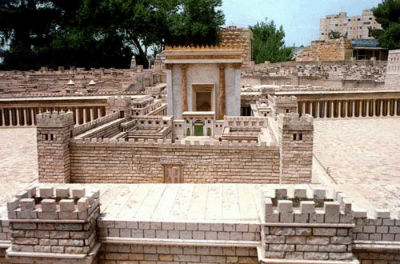 Tabernacle and Temple were beautiful but effective only till the perfect sacrifice came.
Tabernacle and Temple were beautiful but effective only till the perfect sacrifice came.By Ralph Read
Good morning, brethren.
This spring, almost every Christian group will celebrate in some form or another death and resurrection of Jesus Christ.
I found all these aspects of the spring festivals contained in a section of Scripture I want to explain a bit today. This is Hebrews 9:11-14. Let’s get an overview of what it says. First it mentions “the good things that are already here” in the New International Version (NIV) in verse 11. Then there is “eternal redemption” in verse 12, “cleansing of our consciences” mentioned in verse 14, along with “acts that lead to death.”
Let’s take a look at each in turn. But first we need to get the context in Hebrews 9:1-10.
 Tabernacle and Temple were beautiful but effective only till the perfect sacrifice came.
Tabernacle and Temple were beautiful but effective only till the perfect sacrifice came.Paul is writing here all about the Old Testament tabernacle system. It had various regulations for worship and Paul particularly focuses on services for the Jewish Yom Kippur. This involved the High priest entering into the Most Holy Place, the inner spot in the Tabernacle and later the Temple. The priest took in animal blood to sprinkle on the Ark of the Covenant, etc. and the fact that no one else could enter in showed that the way of salvation was not totally open to all of humankind.
But…”when Christ came” things were now different. He went into heaven itself through or “by” his own blood as the NIV says. That is the first of the “good things that are here.” Christ has paid the penalty for our sins and that is a vital part of the good news or Gospel (Romans 10:15). I don’t know about you but that is certainly something to celebrate and observe. Jesus has given us a living hope it says in 1 Peter 1:3-5 and Hebrews 9:28 confirms that he was sent “to take away the sins of many people.”
What a blessing!
Another good thing is redemption or salvation. Redemption can be referred to as a ransom out of slavery (Numbers 19) and we were all enslaved to sin. If bull’s blood and goat’s blood sanctified the worshippers of Israel in what was a ceremonial cleansing “how much more,” asks Paul, will Christ’s death accomplish?
One good thing is a “cleansing of the conscience.” The MacArthur Study Bible says “there is no greater burden than the guilt of our sins.” How true. But God promised us in the prophets that though our sins were like scarlet they could be white as wool, though they be red like crimson they will be as white as snow. That’s in Isaiah 1:18 and it is a treasure. 1 John 1:9 says “If we confess our sins he is faithful and just and will forgive us our sins and purify us from all unrighteousness.”
This aspect of ritual or physical purification is what the Old Testament tabernacle system was all about. But how much greater the good things that we have in the New Covenant!
What are these? MacArthur feels they can be translated as the rituals of the Old Covenant system. In Galatians 2:16 Paul says pretty plainly that “we may be justified by faith in Christ and not by observing the law, because by observing the law no one will be justified.” Everything in the Old Covenant was a type and example that pointed to those good things that are already here. This is why Hebrews 9:11 says he went through a greater and more perfect tabernacle…that is not a part of this creation.” His atoning sacrifice made it possible for we forgiven sinners to “serve the living God” (verse 14).
Another aspect of “dead works” certainly has to be the sinful works of the flesh which Paul outlined in Galatians 5:19-21 – sexual immorality, impurity and debauchery and also factions, discord, selfish ambition, etc. These lead to death and must be continually put to death by us applying the sacrifice of Christ to our sins. And thus our conscience is purged and thus we serve the living God as his children.
These are things the Christian world reenacts and rehearses every spring and we look forward to their observance against this year.